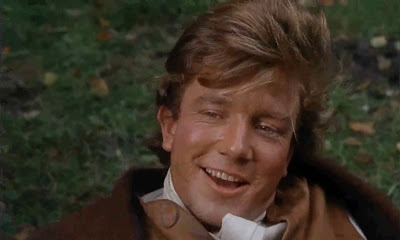 |
| Lovable rogue Tom Jones (Albert Finney) embarks on a series of misadventures. |
Release Date: June 26, 1963. Running Time: 128 minutes. Screenplay: John Osborne. Based on the book, The History of Tom Jones, a Foundling, by Henry Fielding. Producer: Tony Richardson. Director: Tony Richardson.
This review is based on the 1963 theatrical cut.
THE PLOT:
As a baby, Tom Jones (Albert Finney) was left in the bed of Squire Allworthy (George Devine). The squire exiles the mother, but he announces that he will raise the boy as his own. This allows young Tom to grow into a life of privilege on Allworthy's 18th century estate... which also provides him with ample opportunities for cheerful debauchery.
Tom falls in love with Sophie Western (Susannah York), daughter of Allworthy's hard-drinking neighbor, Squire Western (Hugh Griffith). Sophie's father wants her to marry Allworthy's nephew, the "respectable" yet venomous Blifil (David Warner)... and he flies into a rage when he discovers that Sophie has actually set her sights on Tom.
The ensuing uproar is enough, with a nudge from Blifil, to persuade Allworthy to exile Tom from his lands. At the same time he leaves, Sophie flees separately to London. After a series of misadventures, Tom ends up following. However, this lusty yet essentially innocent young man is no match for the intrigues of London society...
 |
| Tom flirts with pretty Sophie Western (Susannah York). |
ALBERT FINNEY AS TOM JONES:
Tom has grown up in privilege and has used that opportunity to apply himself to exactly five pursuits: women, drink, women, hunting, and women. Even the movie's own narrator acknowledges that he's "a bad hero... with many a weakness." A risky protagonist to spotlight, since this movie wouldn't work at all if viewers weren't invested in his fate.
Fortunately, Albert Finney makes Jones effortlessly likable from the first frame. With an infectious open grin, Tom seems to be always ready for mischief. Finney gives a highly physical performance, seeming most alive when Tom is fighting or hunting. When he's restrained from activity, as when he breaks an arm early on, you can sense the frustration in being forced to remain still.
The script takes pains to show his compassion, particularly in contrast to the "respectable" members of his society. An early scene (that was bizarrely snipped from the 1989 director's cut) sees him arguing for the life of a commoner who committed the capital crime of... um, buying a sheep from a poacher. Even as Tom begs his uncle for mercy, his utterly proper tutors insist this is "a hanging offense."
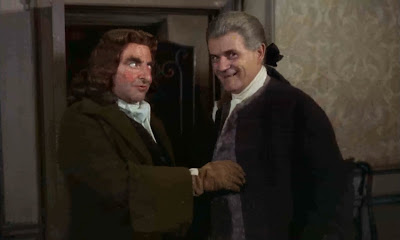 |
| Squire Western (Hugh Griffith) plots to marry Sophie to the estate of Squire Allworthy (George Devine). |
OTHER CHARACTERS:
Sophie Western: She gets to know Tom as he recovers from a broken arm, the result of him rescuing her. A montage shows their courtship, which differs from Tom's other dalliances by being as chaste as it is playful. It isn't long before she learns of his various misdeeds, but her anger never manages to survive being in the same room with him. It doubtless helps Tom's case that Sophie's other suitors, such as the Blifil and the lascivious Lord Fellamar (David Tomlinson), are boorish, or obnoxious, or both. Susannah York is lovely, and she and Finney make for an engaging screen couple.
Squire Western: Hugh Griffith was reportedly as often drunk during the film's production as his character, with the scene of Western's horse falling on him an unplanned result of his intoxication. Regardless, Griffith is very entertaining. Squire Western is much like Tom in his appreciation for hunting, women, and alcohol (not necessarily in that order). Unlike Tom, he has a venal side, which makes him eager to marry his daughter off to the wealthy Blifil. Not so eager, however, as to make him pass up the chance to join in a hunt.
Miss Western: Western's sister, Sophie's aunt, who is as prim as her brother is coarse. At one point, she runs into a hapless would-be bandit, leaving him speechless when she refuses to lower herself to be robbed by the likes of him. The combination of haughty Edith Evans and boisterous Hugh Griffith makes for some fun moments, the two forming an odd couple, each detesting the other but also united in wanting "a good marriage" for Sophie (read: a marriage that makes them rich).
Blifil: David Warner had done a small amount of television work before this, but Tom Jones represents his first feature film credit. Not a bad first film role, with Blifil getting a fair amount of screen time in the first half and acting as the main villain. Warner projects a stiff, unsmiling figure. Even before Blifil has given the viewer reason to dislike him, most will have determined from his bearing that this is a cold and cruel individual.
Squire Allworthy: Veteran actor George Devine is left to play straight man opposite his more colorful co-stars. To his credit, he registers strongly, creating a character whose innate goodness the viewer never has cause to doubt. He does not recognize Blifil for the snake he truly is. However, it's clear enough that he prefers Tom on an instinctive level, sensing the decency buried beneath the wildness.
 |
| Proper and despicable: Tom's tutors (John Moffatt, Peter Bull) and his rival, Blifin (David Warner). |
THOUGHTS:
Movies are products of the times in which they are made. This is extremely true of Tom Jones, and it is likely the reason that it ended up becoming a Best Picture Winner.
Certainly, this fairly lightweight and silly comedy seems at odds with the Academy's usual picks. Its release was perfectly timed, however, perfectly capturing a moment in which values and culture were shifting. When viewed through that prism, it gains meaning. The bawdy, freewheeling, yet essentially decent Tom could be seen as a stand-in for 1960s youth, while the older generation is represented through characters who are as repressed as they are cruel (Blifil, the tutors) or who are rank hypocrites, putting on a guise of morality while indulging more freely than Tom would ever dream of doing.
The story itself is silly, and director Tony Richardson leans into that with exaggerated scene transitions, freeze frames, speed-ups (Tom escapes an assignation in Benny Hill style fast motion), and multiple fourth wall breaks. However, unlike some other films of the period, which can seem uncontrolled and chaotic when viewed today, Tom Jones is also grounded with impeccable period recreation, worthy of a prestige drama.
These and other merits apply, and the movie is rarely less than enjoyable. Even so, I have to confess: I do not love Tom Jones. Tom's misadventures grow a touch repetitive. All the women instantly adore him, and he rarely initiates any of his encounters. He just can't help but going along, as he explains to one conquest: "If you take my heart by surprise, the rest of my body has the right to follow." Which he almost immediately proves, even as the lady chides him for taking so long.
This pattern repeats throughout. It's amusing for a while, with some creative variations. A dinner Tom shares with a woman he's rescued (Joyce Redman) is almost certainly the movie's most famous scene. They begin by staring suggestively at each other while eating their food. Then it grows steadily more over the top, with the suggestions becoming increasingly blatant and occasionally messy.
Still, for me at least, there came a point at which the same joke was told once or twice too often. A late film shift, with both comic and dramatic momentum built at the climax, helps the movie to end on a high note - but I'd be lying if I said I didn't do a bit of seat-shifting before that point.
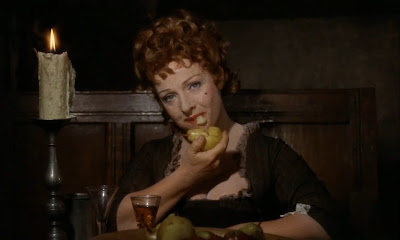 |
| Tom's latest conquest (Joyce Redman) shares an increasingly suggestive meal with him. |
THE DIRECTOR'S CUT:
Given that Tom Jones is itself an anomaly among Best Picture winners, I suppose it's appropriate that Tony Richardson's 1989 re-release is also one. Unlike virtually any other director's cut I can name, this one features no new material. Instead, Richardson and editor Robert Lambert removed footage, tightening the overall film by about 7 minutes.
There are benefits. The pace is tightened, with a few redundant scenes pulled and some unnecessary dialogue removed. But the film's greatest strength is its freewheeling, almost improvisational atmosphere. The structural tightening of the director's cut weakens that. The movie meanders less, but at the cost of feeling less unique.
Also, as I mentioned earlier, a critical early scene showing Tom's compassion was removed. Without this, viewers get less of a sense of him as a good man with a few bad habits. It's not that it removes rooting interest - Finney is still charming, and Tom remains far more likable than his adversaries. But his actual decency is less firmly established, which I think hurts the picture.
Thankfully, the Criterion Collection release includes both versions, allowing fans of the film to decide for themselves which is the better variant. But my vote goes firmly to the 1963 theatrical cut.
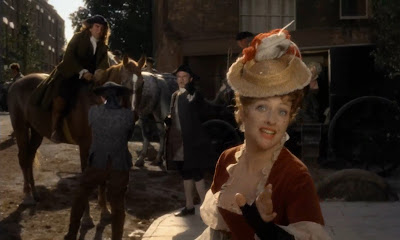 |
| Breaking the fourth wall: Mrs. Waters shares exposition with the viewers as Squires Western and Allworthy look on. |
REMAKES & RETELLINGS:
Henry Fielding's novel was published in 1749, and it was adapted to stage (including opera) as early as 1765. So it's little surprise that Tony Richardson's 1963 movie is not the only film version of this story...
The Bawdy Adventures of Tom Jones (1976): This is a fairly direct remake, only this time as a musical. It stars Nicky Henson as Tom, with Trevor Howard as Squire Western, William Mervyn as Squire Alworthy, and Madeline Smith as Sophia. I haven't seen it, but it was not well received at the time and is barely remembered at all today.
The History of Tom Jones, a Foundling (1997): This five-episode BBC adaptation reputedly is more faithful to the original novel, and it was generally well reviewed on release. As usual with BBC productions, the cast is impeccable: Max Beesley as Tom, Samantha Morton as Sophie, James D'Arcy as Blifil, and Brian Blessed as (a presumably very over-the-top) Squire Western. Not to mention supporting turns from Frances de la Tour, Kelly Reilly, Peter Capaldi, Lindsay Duncan, John Sessions, and Sylvester McCoy, among others. Again, I haven't seen it, but I would bet on it being good - quite possibly better than the 1963 movie.
Tom Jones (2023): The most recent version is a four-part television mini-series with Solly McLeod as Tom and Sophie Wilde as Sophia Western. Reviews were mixed, with generally positive words for the cast but some reviewers feeling that it lacked spark.
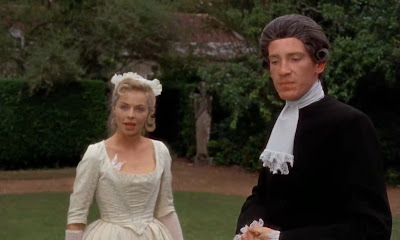 |
| Sophie is appalled when her father favors Blifil as a suitor. |
OVERALL:
I'm slightly torn in assigning a score to Tom Jones. It's an interesting film, both in terms of its mix of cinematic techniques and because of just how strongly it captured the shifting social values that were becoming evident by 1963. It's also a genuinely entertaining movie, and it's kind of refreshing to see the Best Picture Oscar go to something so... well, silly.
But I also find my interest waning as the story unfurls. I've seen this one a few times now, and I always end up finding it hollow by the end. The leads are likable, it's mostly a fun watch, and it's extremely well made. At the same time, the structure gets repetitive, and there just isn't all that much "there."
I know plenty of people who love it, and it is certainly worth a watch. But it's never going to rank among my favorites.
Rating: 6/10.
Best Picture - 1962: Lawrence of Arabia
Best Picture - 1964: My Fair Lady
Review Index
To receive new review updates, follow me:
On BlueSky:
On Threads:


No comments:
Post a Comment